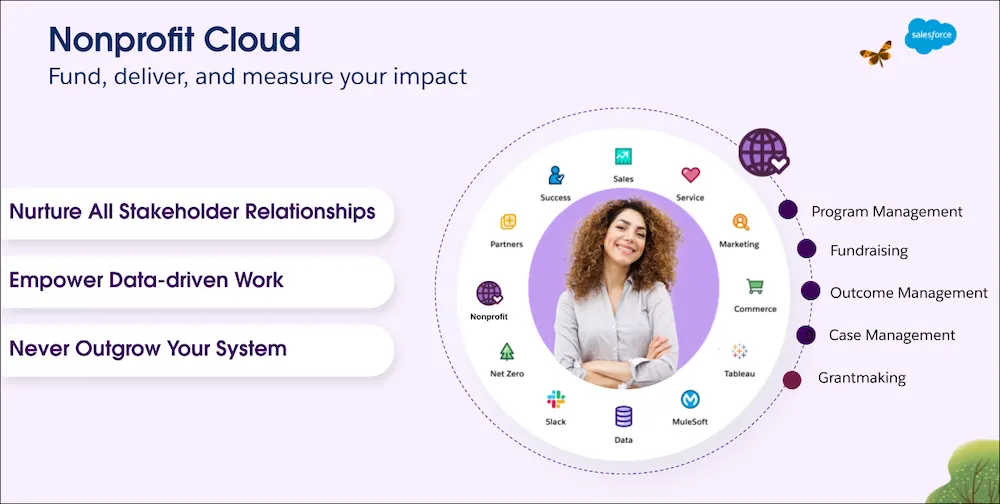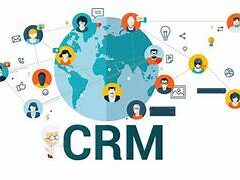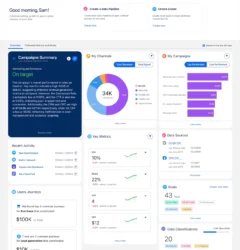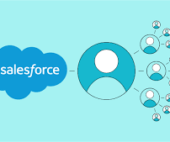Transforming Nonprofit Operations with Salesforce: Lessons from a Real-Life Success Story
Actionable insights for nonprofits to streamline operations and amplify impact-Salesforce Strategies to Improve a Nonprofit
Running a nonprofit is challenging enough without the added frustration of disjointed systems. Many nonprofits grapple with scattered databases, isolated email tools, and incompatible fundraising platforms, resulting in inefficiencies and operational headaches. When systems operate in silos, teams waste time on manual data entry and backtracking, which hinders program delivery and donor engagement—putting the mission at risk.
Enter Salesforce Nonprofit Cloud, a transformative platform designed to centralize operations, improve donor communication, and provide actionable insights. With 93% of Salesforce users reporting positive ROI, the platform empowers nonprofits to focus on what matters most: driving impact.
Salesforce can revolutionize nonprofit operations.
Case Study: Supporting Families Through Salesforce
Client: Children’s Organization for displaced children in Ukraine
Mission: To help children separated from their families during the war in Ukraine by providing bilingual, family-narrated audiobooks and beautifully illustrated storybooks.
Challenge:
While Better Time Stories had a meaningful mission, their operational processes were a roadblock. Their delivery system struggled with:
- Duplicate requests and inaccurate addresses
- Multiple packages sent to the same household
- Resource inefficiencies impacting their ability to reach more families
The Approach
1. Goals Set
- Eliminate redundancies: Redesigned request forms to prevent duplicate submissions and ensure one package per household.
- Expand reach: Configured Salesforce to manage deliveries across new regions (Belgium, Germany, and Austria).
- Improve data accuracy: Introduced validation steps to minimize lost packages and ensure on-time deliveries.
Results
With these optimizations, Better Time Stories significantly improved delivery success:
- Pre-project delivery success: 70%
- Post-optimization success: Over 90%, including 2,400 packages to Germany, 190 to Belgium, and 130 to the Netherlands.
Continuous system support ensured seamless operations and enhanced the organization’s ability to meet its mission.
Key Strategies for Nonprofits Using Salesforce
1. Automate Donation and Impact Tracking
- What Salesforce did: Automated error detection for donation entries to reduce manual reviews.
- Best practice: Use Salesforce Flow to flag duplicates and errors, freeing staff to focus on strategic tasks.
2. Personalize Donor Journeys
- Why it matters: Personalized outreach strengthens donor relationships and drives long-term support.
- How to do it:
- Segment donors by engagement level using Marketing Cloud.
- Automate targeted emails with tailored progress updates and thank-you messages.
3. Create Custom Workflows
- Example: For Better Time Stories, we streamlined the flow from donation to delivery, cutting unnecessary manual steps.
- Recommendation: Leverage Salesforce Flow to design step-by-step workflows for approvals and task hand-offs.
4. Integrate Salesforce with Other Tools
- Why it’s critical: Integration eliminates data silos and enables real-time updates.
- How we did it: Connected Salesforce with the nonprofit’s email and project management tools to enhance visibility and collaboration.
- Recommended tool: Use MuleSoft for seamless integrations across platforms.
5. Enable Advanced Reporting
- Impact: Custom reports helped Better Time Stories track package delivery rates, donation trends, and program effectiveness.
- Tool tip: Use Salesforce Report Builder to schedule automatic reports and share key insights with stakeholders.
6. Build Volunteer and Beneficiary Portals
- Why it helps: Portals reduce administrative burden and empower users to self-serve.
- Implementation: Use Salesforce Experience Cloud to create:
- Volunteer portals for scheduling and logging hours
- Beneficiary portals for tracking service requests
7. Leverage AI for Strategic Decisions
- How it works: Salesforce Einstein uses AI to identify high-value donors and optimize engagement strategies.
- Best use case: Predict donation patterns and personalize outreach for maximum impact.
8. Design Scalable Data Architecture
- Why it matters: Scalability ensures your CRM grows with your nonprofit.
- What we recommend:
- Implement flexible permission sets for role-based access.
- Collaborate with your Salesforce partner to future-proof your system.
9. Conduct Regular Health Checks
- Why it’s essential: Routine reviews keep your CRM aligned with evolving needs.
- Pro tip: Schedule quarterly maintenance to address potential issues before they disrupt operations.
Conclusion
Nonprofits need solutions that simplify operations and maximize impact. Salesforce Nonprofit Cloud offers the tools to centralize processes, enhance donor engagement, and drive mission-critical outcomes.
By following these strategies and working with an experienced implementation partner, your nonprofit can achieve operational excellence and focus on delivering meaningful results.
Ready to transform your nonprofit operations with Salesforce? Let’s make it happen!
🔔🔔 Follow us on LinkedIn 🔔🔔













